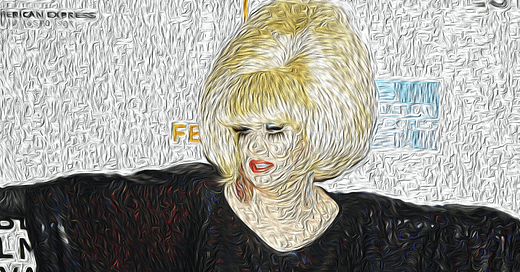A Goonie (like Lady Bunny) Bataille and de Sade held by him in high esteem, his core crew— let no one ever get it confused— is an eclectic band of misfits (living, dead, and yet to be born), challengers of groundless taboos: apologists for miscegenation, for crossdressing and cannibalism, for zoophilia and necrophilia, for polyamory and incest, for prostitution and suicide; exposers of hypocrisies like glomming down (morning and night) cow and chicken while finding it immoral to eat dog and horse, or like glomming down (morning and night) the reproductive flesh of plants— creatures that cannot run away, that scream when cut—while finding it immoral to steal milk and honey (the only two murder-free foods) from cows and bees.—So no, never is he to be lumped together with the regressive right. Ecce homo. His war is against the cancellers— especially the weird among them since, on top of seeming the loudest right now, the biggest enemy of weirdos are weirdos who do not want to be seen as weirdos. His war is against the censors, the anti-Nietzschean shamers, who impose the anti-diversity demand that reality be made a “safe space” where they will never be shaken by literature and professors, by statistics and comedians, by science and outsiders— a world where it is “wrong think” (indeed, traumatic violence) to say, for example, “Obesity is unhealthy” or that “There might be a basis in biology to sex differences” or that “There is likely a fad element to entire friend groups of tweens all of a sudden coming out as trans” or that “It is sad to see kid surgeries to eradicate body parts merely at odds with antiquated sex-stereotypes” or that “Young people especially are just itching to be offended—well, at least to say they have been—since we live in a victimhood culture rather than a nobility culture” or that “black victimhood mentality, the (lucrative) mindset of little hope that individual initiative could rise above the barriers of white supremacy, so sabotages black excellence it seems the very design of white supremacy.” His war against this safe-space ethos, including those HR and DEI officers who enliven it well beyond theory, has uncomfortably entangled him with anti-weirdness bigots, with rightwing freak-haters, more anti-Nietzschean shamers who— although finding it as ridiculous as he does that, for instance, professors are fired for their art, for their Twitter, for their lectures on the unsettling facts of history (especially if they mention rape or, heaven forbid, the n-bomb)— are mean and petty enough to mock trans and fat people for being “vomitrocious,” who lack the courtesy to call others by their chosen pronouns, who themselves scream falsities like “Men cannot give birth” or like “Unless demented, lying is anyone who tells you obesity is beautiful.”
*This poem is unpublished—indeed, extremely warm from the oven. So it could use a lot of help!
Photo Credit: David Shankbone






The piece titled "A Goonie (like Lady Bunny)" engages with the complex intersections of radical individualism, social taboos, and the contemporary culture wars. Drawing inspiration from controversial figures like Georges Bataille and the Marquis de Sade, the author constructs a persona who champions an eclectic set of beliefs and practices, ranging from miscegenation and crossdressing to more extreme behaviors such as cannibalism and zoophilia. This persona is framed as an unapologetic opponent of societal norms, particularly those that the persona views as hypocritical—such as the consumption of certain animals while condemning others, or the harvesting of plant life while decrying the use of animal byproducts.
The piece further explores the persona's war against what he perceives as the "safe-space ethos" pervasive in contemporary culture, particularly in the context of cancel culture, censorship, and the suppression of dissenting views. The persona criticizes the anti-Nietzschean tendencies of modern society, where intellectual and artistic freedom is curtailed in the name of protecting sensitivities. This critique extends to the policies of HR and DEI (Diversity, Equity, and Inclusion) departments, which the persona sees as reinforcing this ethos beyond the theoretical level.
Interestingly, the persona's alignment against cancel culture and safe-space mentality brings him into uncomfortable proximity with right-wing figures who, despite sharing his disdain for censorship, harbor regressive views on issues like gender identity and body positivity. The piece highlights the irony of this entanglement, as the persona finds himself allied with those who mock trans and fat people, despite his own advocacy for freedom from societal norms. The tension between the persona's radical libertarianism and the bigotry of some of his allies underscores the complexity and contradictions inherent in the modern discourse on freedom, identity, and social justice.
radical individualism, cancel culture, censorship, social taboos, Nietzschean critique, safe-space ethos, Bataille, de Sade, trans rights, fat shaming, identity politics, social justice, DEI, cultural hypocrisy.